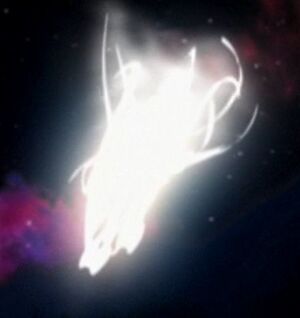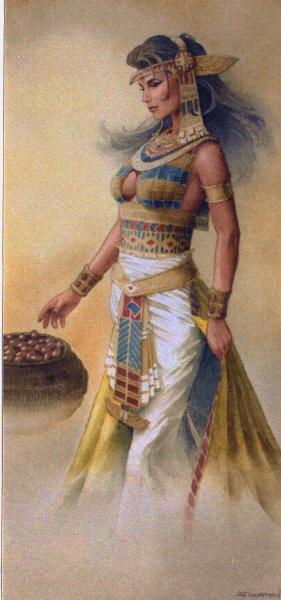Atum: Difference between revisions
| Line 24: | Line 24: | ||
==The Flowering== | ==The Flowering== | ||
==Physical Form== | ==Physical Form== | ||
[[File:Ascendedbeing.jpg|thumb|left|An ascended being, photographed near Terra]][[File:Atumf.jpg| | [[File:Ascendedbeing.jpg|thumb|left|An ascended being, photographed near Terra]][[File:Atumf.jpg|125px|frame|right|Atum in a female Shabti-host]]An ascended being, Atum lacks a truly fixed physicality, instead existing as a form of energy imprinted on a region of space-time, able to travel at enormous speed and operate in ways that encompass what is usually described as magic by beings with lesser understanding. The powers of an ascended being are generally unknown, but are certainly vast. Few among their kind are known, and entire civilizations such as [[Malgrave]] are structured around the goal of attaining this state of release from mortal concerns. Many describe these beings as appearing akin to a glowing light or tentacled form, while others maintain that this is merely an energy-interface and such beings do not physically exist in space-time perceptible to humans. | ||
While these beings are known to be able to assume the hallucinatory appearance of humaans, in order to exist within human society for any length of time Atum has used several means, one of which is the creation of a vessel using advanced technology to bind part of his essence into a physical shape, another, more recent innovation is the ability to use spiritually-blank non-sapient facsimilies of human beings as vessels. Those personally used by Atum are known as an advanced form of these 'shabti' - named for clay funerary statues intended to perform work in place of the deceased - with sophisticated and powerful abilities. | While these beings are known to be able to assume the hallucinatory appearance of humaans, in order to exist within human society for any length of time Atum has used several means, one of which is the creation of a vessel using advanced technology to bind part of his essence into a physical shape, another, more recent innovation is the ability to use spiritually-blank non-sapient facsimilies of human beings as vessels. Those personally used by Atum are known as an advanced form of these 'shabti' - named for clay funerary statues intended to perform work in place of the deceased - with sophisticated and powerful abilities. | ||
Notably in this human form, Atum appears to personify the mythology he has assumed by using both genders of host roughly equally, and although this article uses the male pronoun, Atum as frequently appears female as male. | |||
==Family Life== | ==Family Life== | ||
==Adoptive Mythology== | ==Adoptive Mythology== | ||
==Modern Religion== | ==Modern Religion== | ||
Revision as of 00:41, 11 July 2019
Hailed as a god and divine ruler of The Hundred Worlds of Lord Atum which bears his name, Atum is perhaps one of the most powerful tyrants in the galaxy.
Birth and Early Life
Underlord of Ra
Rise to Power
Death
Ascension
The Flowering
Physical Form
An ascended being, Atum lacks a truly fixed physicality, instead existing as a form of energy imprinted on a region of space-time, able to travel at enormous speed and operate in ways that encompass what is usually described as magic by beings with lesser understanding. The powers of an ascended being are generally unknown, but are certainly vast. Few among their kind are known, and entire civilizations such as Malgrave are structured around the goal of attaining this state of release from mortal concerns. Many describe these beings as appearing akin to a glowing light or tentacled form, while others maintain that this is merely an energy-interface and such beings do not physically exist in space-time perceptible to humans.
While these beings are known to be able to assume the hallucinatory appearance of humaans, in order to exist within human society for any length of time Atum has used several means, one of which is the creation of a vessel using advanced technology to bind part of his essence into a physical shape, another, more recent innovation is the ability to use spiritually-blank non-sapient facsimilies of human beings as vessels. Those personally used by Atum are known as an advanced form of these 'shabti' - named for clay funerary statues intended to perform work in place of the deceased - with sophisticated and powerful abilities.
Notably in this human form, Atum appears to personify the mythology he has assumed by using both genders of host roughly equally, and although this article uses the male pronoun, Atum as frequently appears female as male.


